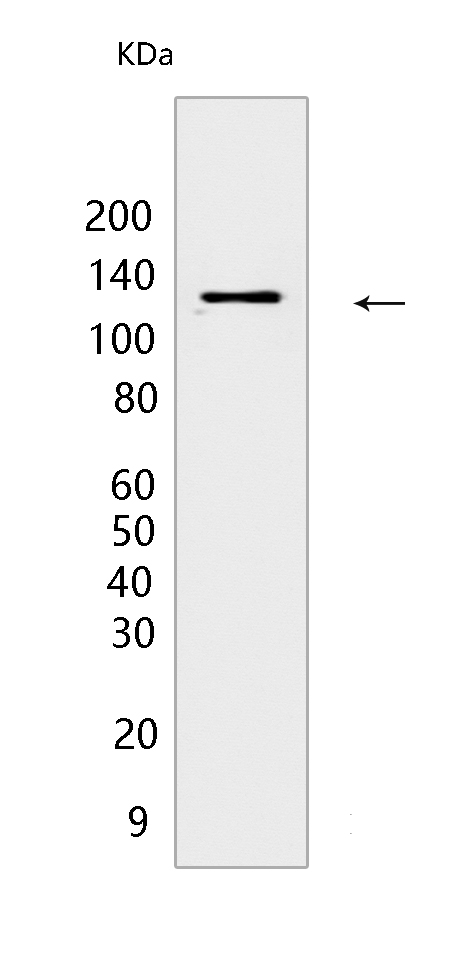CCAR2 Mouse mAb[97MD]Cat NO.: A32540
Western blot(SDS PAGE) analysis of extracts from HeLa cells.Using CCAR2 Mouse mAb IgG [97MD] at dilution of 1:1000 incubated at 4℃ over night.
Product information
Protein names :CCAR2,DBC1,KIAA1967,CCAR2_HUMAN,Cell cycle and apoptosis regulator protein 2
UniProtID :Q8N163
MASS(da) :102,902
MW(kDa) :130kDa
Form :Liquid
Purification :Protein A purification
Host :Mouse
Isotype :IgG
sensitivity :Endogenous
Reactivity :Human
- ApplicationDilution
- 免疫印迹(WB)1:1000-2000
- 免疫组化(IHC)1:100
- 免疫荧光(ICC/IF) 1:100,
- The optimal dilutions should be determined by the end user
Specificity :Antibody is produced by immunizing animals with a synthetic peptide of human CCAR2.
Storage :Antibody store in 10 mM PBS, 0.5mg/ml BSA, 50% glycerol. Shipped at 4°C. Store at-20°C or -80°C. Products are valid for one natural year of receipt.Avoid repeated freeze / thaw cycles.
WB Positive detected :HeLa cells
Function : Core component of the DBIRD complex, a multiprotein complex that acts at the interface between core mRNP particles and RNA polymerase II (RNAPII) and integrates transcript elongation with the regulation of alternative splicing: the DBIRD complex affects local transcript elongation rates and alternative splicing of a large set of exons embedded in (A + T)-rich DNA regions (PubMed:22446626). Inhibits SIRT1 deacetylase activity leading to increasing levels of p53/TP53 acetylation and p53-mediated apoptosis (PubMed:18235501, PubMed:18235502, PubMed:23352644). Inhibits SUV39H1 methyltransferase activity (PubMed:19218236). Mediates ligand-dependent transcriptional activation by nuclear hormone receptors (PubMed:19131338). Plays a critical role in maintaining genomic stability and cellular integrity following UV-induced genotoxic stress (PubMed:23398316). Regulates the circadian expression of the core clock components NR1D1 and ARNTL/BMAL1 (PubMed:23398316). Enhances the transcriptional repressor activity of NR1D1 through stabilization of NR1D1 protein levels by preventing its ubiquitination and subsequent degradation (PubMed:23398316). Represses the ligand-dependent transcriptional activation function of ESR2 (PubMed:20074560). Acts as a regulator of PCK1 expression and gluconeogenesis by a mechanism that involves, at least in part, both NR1D1 and SIRT1 (PubMed:24415752). Negatively regulates the deacetylase activity of HDAC3 and can alter its subcellular localization (PubMed:21030595). Positively regulates the beta-catenin pathway (canonical Wnt signaling pathway) and is required for MCC-mediated repression of the beta-catenin pathway (PubMed:24824780). Represses ligand-dependent transcriptional activation function of NR1H2 and NR1H3 and inhibits the interaction of SIRT1 with NR1H3 (PubMed:25661920). Plays an important role in tumor suppression through p53/TP53 regulation,stabilizes p53/TP53 by affecting its interaction with ubiquitin ligase MDM2 (PubMed:25732823). Represses the transcriptional activator activity of BRCA1 (PubMed:20160719). Inhibits SIRT1 in a CHEK2 and PSEM3-dependent manner and inhibits the activity of CHEK2 in vitro (PubMed:25361978)..
Tissue specificity :Expressed in gastric carcinoma tissue and the expression gradually increases with the progression of the carcinoma (at protein level). Expressed ubiquitously in normal tissues. Expressed in 84 to 100% of neoplastic breast, lung, and colon tissues..
Subcellular locationi :Nucleus. Cytoplasm. Cytoplasm, cytoskeleton, spindle.
IMPORTANT: For western blots, incubate membrane with diluted primary antibody in 1% w/v BSA, 1X TBST at 4°C overnight.


